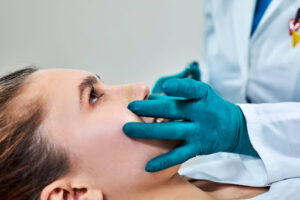The decision to get a chin implant is not one that should be taken lightly. While the benefits of enhanced facial symmetry and confidence can be significant, many people are concerned about the recovery process. How long does it take to recover from a chin implant?
Chin implants are a popular cosmetic surgery procedure that can provide a more defined and balanced lower face. The surgery itself involves inserting a silicone or other synthetic material implant into the chin area, which can enhance the projection and shape of the chin. While the procedure is relatively straightforward, many patients are eager to know what to expect during the recovery process.
If you are considering a chin implant, it is important to understand the recovery process so that you can plan accordingly. The recovery period can vary depending on a variety of factors, including the extent of the surgery and the individual patient’s healing process. However, by following your surgeon’s post-operative instructions and taking good care of yourself, you can help ensure a smooth and comfortable recovery. In this article, we explain the typical recovery process after a chin implant and provide tips for a successful recuperation.
Who Gets Chin Implants?
Chin implants are a popular cosmetic procedure that is designed to enhance the shape and size of the chin. This procedure is typically recommended for patients who have a weak or receding chin, as well as those who want to achieve a more defined and balanced facial profile.
Chin implants are also commonly used to correct a variety of facial asymmetries and deformities, such as those caused by birth defects, injuries, or aging. Overall, chin implants are a safe and effective way to improve the appearance of the chin and create a more harmonious and attractive facial contour. However, it is important to consult with a qualified head and neck surgeon practicing in facial plastic surgery to determine if this procedure is right for you and to ensure that you achieve one of the best possible results.
What Happens During Chin Implant Surgery?
During chin implant surgery, a board-certified specialist places a silicone or other synthetic material implantunder the skin to increase its size and shape. The goal of this surgery is to provide more definition, contour, projection, and balance to a patient’s chin bone.
Chin augmentation surgeries are typically done under local anesthesia and do not require general anesthesia unless combined with some other surgical procedures. Incisions may be made either inside the mouth or beneath the chin. While there is some degree of risk associated with any surgical procedure, such as the risk of infection, patients who take care of their health and follow their doctor’s advice can expect positive outcomes from their chin implant procedure.
How Long Does It Take To Heal After Chin Implant Surgery?
The recovery process after chin implant surgery varies from person to person. It usually takes patients between two weeks and four months to recover depending on how extensive the procedure was. Following the instructions provided by your doctor should help speed up healing time significantly.
Generally speaking, patients should expect some swelling and bruising around their face and neck area during the first few weeks after surgery. As these symptoms subside over time, they will start seeing the results of their facial profile enhancement and the improved definition of their chin contour.
Here’s what you need to know about healing after undergoing chin surgery:
- The initial recovery period: Patients should expect some swelling in the area for several days following the procedure. Most of this will subside within two weeks. You may also experience some numbness or tingling in the area around your chin but these sensations should dissipate soon after surgery.
- Soft foods: It is advised that patients stick to soft foods during the recovery period. This means eating a lot of soups, smoothies, and other foods that are easier on your jawline while healing takes place.
- Daily activities: It’s important to avoid strenuous activities such as exercise and heavy lifting right after surgery until the doctor has deemed you are fully healed.
- Follow-up appointments: Following up with your surgeon regularly is essential to monitor any changes or complications related to the procedure. Be sure to attend all follow-up appointments so that your physician can assess how well you are recovering from the operation.
What Can You Not Do After A Chin Implant?
Patients should avoid strenuous physical activity including running, weight lifting, or exercise since these activities impede the normal healing process. It’s essential to keep the targeted area clean and check for signs of infection.
How Long Does A Chin Implant Hurt?
After surgery, it’s common for there to be swelling and some pain. It usually takes about four weeks for most patients to see their final results after getting a chin augmentation. However, since everyone’s body heals differently, recovery time may vary from person to person.
Most people report tolerable levels of discomfort but, if needed, your doctor can recommend over-the-counter or prescription pain medication to help manage the symptoms. He will also provide instructions regarding care during your postoperative period which should include limiting activity for several days as well as avoiding certain foods until healing has occurred.
How Risky Is A Chin Implant?
While there are some risks associated with chin implants, by choosing a qualified surgeon, closely following their post-operative advice, and being aware of potential signs of infection, patients can minimize the risk of complications.
The most common materials used are synthetic, such as silicone or Gortex. These have been designed to be biocompatible with human tissue. Although there are many advantages of using these materials for chin enhancement surgery, this does not mean that there is no risk associated with them.
One of the main risks of undergoing chin implant surgery is infection. It is very important to ensure that you choose a board-certified head and neck surgeon practicing in facial plastic surgery who performs sterile techniques when performing your chin enlargement procedure. Additionally, he should help you understand which signs of infection you need to watch out for.
What to do if you have a broken nose?
How Can I Prepare For Chin Implant Surgery?
If you plan to undergo chin implant surgery, here are some tips on how you can prepare for it:
- Consult with a board-certified head and neck surgeon practicing in facial plastic surgery: The first step in preparing for chin implant surgery is to consult with a head and neck surgeon practicing in facial plastic surgery. He will evaluate your chin and facial structure to determine one of the best type of implant to use and discuss the procedure in detail with you. He will also inform you of the potential risks and complications that come with the surgery so that you can make an informed decision.
- Discuss your medications with your surgeon: Your surgeon will also want to know about any medications or supplements you are currently taking, as some of them may need to be stopped or adjusted before the surgery. You may also need to undergo some blood tests to ensure that you are healthy enough for the procedure.
- Stop smoking and drinking alcohol: Both smoking and drinking alcohol can interfere with the healing process, so it’s essential to stop these habits at least two weeks before surgery. Smoking increases the risk of infection and slows down the healing process, while alcohol can thin the blood and lead to excess bleeding during the surgery.
- Prepare your post-surgery care: After the surgery, you will need to take extra care of yourself to ensure a smooth recovery. Your surgeon will provide you with post-surgery care instructions that may include wearing a compression garment, avoiding strenuous activities, and taking prescribed pain medication. You may also need to modify your diet to include softer foods and avoid chewing hard or crunchy foods.
- Arrange for help: It’s essential to have someone around to help you during the recovery period, especially during the first few days after the surgery. You may experience some pain and discomfort, and need assistance with daily activities.
Chin augmentation patients need to understand their chin deficiencies and desired results. They should familiarize themselves with the costs, procedure, and potential risks involved. When consulting with a head and neck surgeon practicing in facial plastic surgery about chin implants, it’s important to discuss your goals such as chin height or volume. Careful planning ahead of time can make the experience more enjoyable for patients.
How much does a chin implant cost?
What Can I Expect After A Chin Implant?
After getting a chin implant, you can expect your chin to project out further and provide an attractive balance with the other features of your face. This is especially beneficial for individuals struggling with a weak chin or double chin. In some cases, it may take up to six weeks for the swelling to subside fully after the surgery is complete.
During this time period, you must pay attention to any health changes that could be indicative of complications arising from the surgery. It is also essential that individuals recovering from a chin implant adhere strictly to their health provider’s advice regarding rest and exercise while they heal properly. Consuming healthy foods and abstaining from smoking can also expedite the healing time significantly.
Chin Implant Consultation
Chin implants are a great way to enhance the shape of your face and make you look more proportionate. If you’re considering undergoing chin implant surgery, booking a consultation with a double-board certified head and neck surgeon practicing in facial plastic surgery guarantees a successful and safe procedure.
During your initial consultation, you’ll discuss your preferences and expectations for your desired chin prominence and shape with your surgeon. He will also explain what’s involved in the procedure and provide examples of potential implants that can be custom fit to enhance your chin contour.





